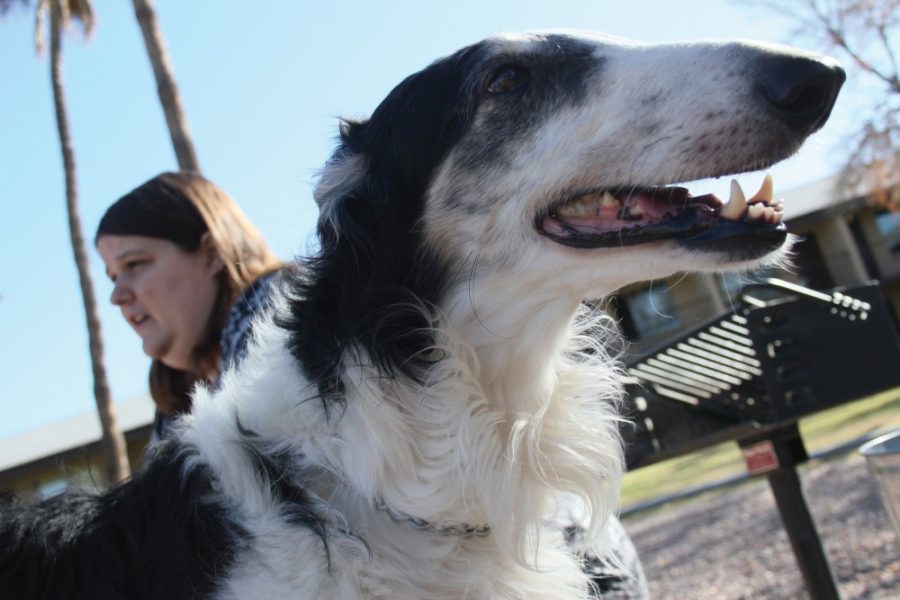Amy Mendel joined the U.S. Army in 2001 and was part of the vanguard that invaded Iraq in 2003. She is now living in northern Vermont and was recently awarded her Combat Action Badge. After returning home as a disabled veteran, Mendel struggled to adjust to everyday life while coping with Post-Traumatic Stress Disorder.
“I could not leave my house by myself,” Mendel said. “If I were to go grocery shopping, even with somebody, I had to wait until it was 11 at night when there weren’t too many people out. I had terrible social anxiety problems and I’d get very lonely and depressed. I had a fear of almost everything.”
Then a dog changed her life.
In April 2011, Mendel saw a story about Operation Wolfhound, a service that places psychiatric service dogs with veterans at no cost.
Mendel received Storm, a 2-year-old Russian wolfhound, or borzoi, and instantly began to notice her life changing for the better.
“Almost immediately after I got him, I was able to go places,” Mendel said. “I still have some of those problems, but it isn’t nearly as bad. And if I start getting some of those issues, Storm knows right away and he will start nudging me and helping me.”
At the age of 16, Rhiannon Miller, now a UA psychology freshman,
developed Operation Wolfhound to help veterans suffering from PTSD restore peace in their everyday lives.
Rhiannon came up with the idea at a time when there was a lot of media coverage about the troops returning from Iraq and the psychiatric challenges that they were facing. Rhiannon was inspired by her parents, both longtime sufferers of PTSD, to create a program that could help.
Now Rhiannon, her mother, her father and three others train the service dogs for veterans in Operation Wolfhound.
Since its start in 2008, the program has placed more than 60 dogs with people in need from Hawaii to New York.
“The best part has been hearing the difference it makes in the veterans’ lives,” Rhiannon said. “One of my favorite stories is about a Vietnam veteran who had been in his house for basically the last 30 years. He would have his groceries delivered and he hadn’t met his neighbors. Within about three weeks of his service dog being placed with him, he [befriended] his neighbors, he started to do his own shopping and went to counseling for the first time. It is stories like that that make me feel better.”
Alicia Miller, Rhiannon’s mother, said Operation Wolfhound is unique in that it’s a free service.
“Most service dogs veterans have to pay for,” said Alicia Miller, Rhiannon’s mother. “The VA [U.S. Department of Veterans Affairs] does not provide them. The veterans, especially when they just come back, can’t afford to pay for a dog to help them and it is something that has to be done to save lives.
“That’s why we do it,” she added. “We are always looking for volunteers because even if we grow fantastically, we will not be able to meet … all the needs that are out there.”
In this stressful transitional stage in veterans’ lives, emotional stability is more important than ever.
Operation Wolfhound is either contacted by veterans who have heard of the emotional benefits that animals can provide, or by counselors trying to help patients who are at the end of their ropes.
The dogs never disappoint.
“We have never had a dog that didn’t warm up to their veteran,” Rhiannon said. “It is amazing. These guys [veterans] are pretty quiet and on guard, so to see them look at the dog and melt, it is pretty adorable and profound.”
The organization typically trains borzoi, because of their emotional independence and intelligence. Their large size is also of fundamental importance due to the physical needs of veterans: Some people with PTSD have nightmares whose intense and graphic flashbacks can result in violent seizures, but big dogs can ensure that the veterans do not injure themselves.
Many of the owners also have mobility issues, and Rhiannon said the borzoi are helpful in situations that cause physical strain.
Dogs chosen by the program receive public access training, where they learn to go up and down escalators and elevators, stay calm in crowds and watch their veteran’s back, which helps veterans dealing with hypervigilance.
“This basically gives them a battle buddy,” Rhiannon said. “When you are in the military, you have someone with you all the time. You have people that are there specifically to watch your back. When you are out of the military, you don’t have that anymore.
“A dog fills that gap. You can trust the dog to watch your back, and you know it is going to be there.”
Now that she is 21 years old, Rhiannon is old enough to run the organization on her own and is working to become the official owner. But no matter what her official position, Rhiannon said that these dogs will always be a part of her life.
“I want Operation Wolfhound to get as big as it needs to get. If other organizations pop up and they can start helping fulfill this need, then I’ll be ecstatic. I want to be part of this for the rest of my life.”









